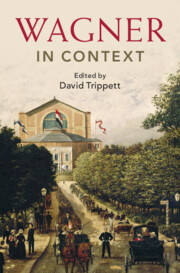Book contents
- Wagner in Context
- Composers in Context
- Wagner in Context
- Copyright page
- Contents
- Illustrations
- Musical Examples
- Contributors
- Acknowledgements
- Abbreviations
- Introduction
- I Place
- II People
- III Politics, Ideas, and Bodies
- IV Life, Language, and the Ancient World
- V Music and Performance
- VI Reception
- Chapter 35 Regietheater in Performance
- Chapter 36 Twentieth-Century Reception and Anti-Semitism
- Chapter 37 Bayreuth as Idea: Chamberlain, Wolzogen, Hitler
- Chapter 38 Performing Wagner in Israel: An Affront or a Tribute?
- Chapter 39 Nineteenth-Century Music Criticism
- Chapter 40 Wotan’s Stormtroopers and the Total Art Machine: Kittler’s Ring of the Nibelung
- Chapter 41 Sound Recording
- Chapter 42 The Wagnerian Erotics of Video Game Music
- Further Reading
- Select Bibliography
- Index
Chapter 38 - Performing Wagner in Israel: An Affront or a Tribute?
from VI - Reception
Published online by Cambridge University Press: 14 March 2024
- Wagner in Context
- Composers in Context
- Wagner in Context
- Copyright page
- Contents
- Illustrations
- Musical Examples
- Contributors
- Acknowledgements
- Abbreviations
- Introduction
- I Place
- II People
- III Politics, Ideas, and Bodies
- IV Life, Language, and the Ancient World
- V Music and Performance
- VI Reception
- Chapter 35 Regietheater in Performance
- Chapter 36 Twentieth-Century Reception and Anti-Semitism
- Chapter 37 Bayreuth as Idea: Chamberlain, Wolzogen, Hitler
- Chapter 38 Performing Wagner in Israel: An Affront or a Tribute?
- Chapter 39 Nineteenth-Century Music Criticism
- Chapter 40 Wotan’s Stormtroopers and the Total Art Machine: Kittler’s Ring of the Nibelung
- Chapter 41 Sound Recording
- Chapter 42 The Wagnerian Erotics of Video Game Music
- Further Reading
- Select Bibliography
- Index
Summary
An unofficial ban on Wagner’s music has existed in Israel since Kristallnacht in 1938. This chapter places the ban, its adherents, and its detractors, into the context of the early Zionists during the 1890s, and specifically their relation to Wagner’s music. Theodor Herzl, father of modern political Zionism and author of The Jewish State (1896), wrote of the inspiration he took from Wagner’s music for advancing his project, opening the Second Zionist Congress in 1898 with the overture from Tannhäuser. Wagner’s regeneration writings, the discourse of secular Jews in Vienna in search of ‘the soil’ for an independent state outside Europe, and Nietzsche’s advocacy of freedom from religious or dogmatic identities all combined in unfamiliar ways to advocate a future that abandoned a European past, with Wagner in tacit support.
Keywords
- Type
- Chapter
- Information
- Wagner in Context , pp. 381 - 389Publisher: Cambridge University PressPrint publication year: 2024

